祈使句的反义疑问句
句型转换反义疑问句

句型转换反义疑问句反义疑问句是英语中的一种特殊语气形式,用于提出含有情感色彩的问题,常用于肯定句、祈使句后面。
它可以通过改变原句中的疑问形式,来表达一种相反的意思。
本文将探讨句型转换反义疑问句的相关知识,以及一些实用的技巧和例句。
一、句型转换规则在转换反义疑问句时,需要改变原句的疑问部分。
一般情况下,如果原句是肯定句,反义疑问句中的疑问部分采用否定形式;如果原句是否定句,反义疑问句中的疑问部分则改为肯定形式。
同时,也需要根据主谓的人称和数目做出相应的调整。
以下是一些常见的句型转换规则:1. 当原句为肯定陈述句时,反义疑问句的疑问部分使用否定形式,并保持与原句主谓的一致。
例如:- You are a teacher, aren't you?- He can swim, can't he?2. 当原句为否定陈述句时,反义疑问句的疑问部分使用肯定形式,并保持与原句主谓的一致。
例如:- She doesn't like coffee, does she?- They won't come, will they?3. 当原句为祈使句时,反义疑问句的疑问部分使用肯定形式,并保持与原句主谓的一致。
例如:- Don't go, will you?- Keep quiet, won't you?二、句型转换技巧除了常见的句型转换规则外,还有一些技巧可以帮助我们更好地转换反义疑问句。
1. 肯定形式的反义疑问句当原句为肯定形式时,我们可以使用以下句式来转换成反义疑问句:- It looks/ seems/ appears + 肯定/否定形式,doesn't it?- You know/ understand/ remember/ realize + 肯定/否定形式, don't you?例如:- You are coming to the party, aren't you?- He knows the answer, doesn't he?2. 否定形式的反义疑问句当原句为否定形式时,我们可以使用以下句式来转换成反义疑问句:- It looks/ seems/ appears + 否定/肯定形式,does it?- You don't know/ understand/ remember/ realize + 否定/肯定形式, do you?例如:- She doesn't like chocolate, does she?- They don't live here, do they?三、例句展示下面是一些常见句型的例句展示,以便更好地理解句型转换反义疑问句的用法:1. 肯定形式的反义疑问句:- You are a student, aren't you?(你是学生,不是吗?)- She can play the piano, can't she?(她会弹钢琴,对吧?)2. 否定形式的反义疑问句:- He doesn't have any money, does he?(他没有钱,对吗?)- They don't like spicy food, do they?(他们不喜欢辣食,对吧?)3. 祈使句的反义疑问句:- Don't be late, will you?(不要迟到,好吗?)- Keep the door closed, won't you?(请关好门,好吗?)四、总结通过句型转换可以更灵活地运用反义疑问句,丰富英语表达。
18种特殊反义疑问句

初中英语18种特殊的反意疑问句1.祈使句。
祈使句后一般加上will you或won't you构成反意疑问句,用will you 多表示“请求”,用won't you 多表示提醒对方注意。
例如:Look at the blackboard, will you/ won't you?看黑板,好吗?Let引导的祈使句有两种情况:1)Let's...,后的反意疑问句用shall we或shan't we。
例如:Let's go home, shall we/ shan't we? 回家吧,好吗?还可以用may I来表示征求对方的同意或许可。
2)Let us/me...后的反意疑问句用will you或won't you。
例如:Let me have a try, will you/won't you? 让我试一试,行吗?2.感叹句。
感叹句后加反意疑问句时,其反意疑问句需用be的一般现在时态的否定形式。
例如:What fine weather, isn't it? 多好的天气啊,是吧?3. 当陈述部分谓语动词是need, dare, used to,且这些词被用作实义动词时,其反意疑问句需用do的适当形式。
例如:He needs help, doesn't he?他需要帮助,是吗?4.陈述部分主、谓语是I am...时,反意疑问句用aren't I 或ain't I ,而不是am not I (可用am I not)。
例如:I'm working now, ain't I? 我在工作,是吗?5.陈述部分的主语是everything, nothing, anything或something 时,反意疑问句的主语应用代词it。
例如:Something is wrong with my radio, isn't it? 我的收音机出毛病了,是吧?6.陈述部分的主语是everybody, everyone, anybody, anyone, somebody, someone, nobody, no one, none, neither 时, 其反意疑问句的主语需用复数代词they。
初二上教案7祈使句及其反义疑问句
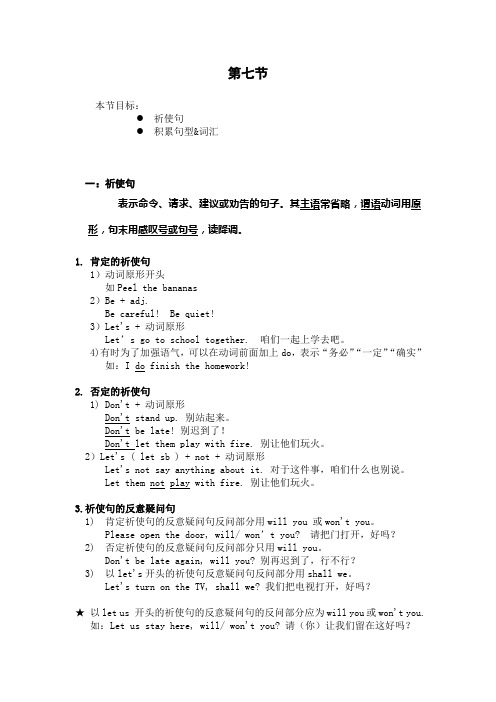
第七节本节目标:●祈使句●积累句型&词汇一:祈使句表示命令、请求、建议或劝告的句子。
其主语常省略,谓语动词用原形,句末用感叹号或句号,读降调。
1. 肯定的祈使句1)动词原形开头如Peel the bananas2)Be + adj.Be careful! Be quiet!3)Let's + 动词原形Let’s go to school together. 咱们一起上学去吧。
4)有时为了加强语气,可以在动词前面加上do,表示“务必”“一定”“确实”如:I do finish the homework!2. 否定的祈使句1) Don't + 动词原形Don't stand up. 别站起来。
Don't be late! 别迟到了!Don't let them play with fire. 别让他们玩火。
2)Let's ( let sb ) + not + 动词原形Let's not say anything about it. 对于这件事,咱们什么也别说。
Let them not play with fire. 别让他们玩火。
3.祈使句的反意疑问句1) 肯定祈使句的反意疑问句反问部分用will you 或won't you。
Please open the door, will/ won’t you? 请把门打开,好吗?2) 否定祈使句的反意疑问句反问部分只用will you。
Don't be late again, will you? 别再迟到了,行不行?3) 以let's开头的祈使句反意疑问句反问部分用shall we。
Let's turn on the TV, shall we? 我们把电视打开,好吗?★以let us 开头的祈使句的反意疑问句的反问部分应为will you或won't you.如:Let us stay here, will/ won't you? 请(你)让我们留在这好吗?即学即练:1._______ cross the road until the traffic lights turn green.A. NotB. Won'tC. Doesn'tD. Don't2. Please help me carry it, ______?A. will IB. will youC. shall ID. shall we3. Don’t make so much noise, ______?A. will youB. won't youC. shall weD. do you4. Kate, _______ your homework here tomorrow.A. bringB. bringsC. to bringD. bringing5.________ me the truth, or I'll be angry.A. TellingB. To tellC. ToldD. Tell6. ----Don’t forget to give my best wishes to your uncle.----A.No, I don’tB.No, I won’tC.Yes, I doD.Yes, I would7. Will you please read it again more slowly? (改为祈使句)___ __ again more slowly, please.8. Let’s watch the sports games. (改为反意疑问句)Let's watch the sports games, _____ _____?9. Please sit next to Nancy. (改为否定句)_____ _____ next to Nancy.10. Don’t forget to turn off the lights, please. (改为反意疑问句)Don’t forget to turn off the lights, _____ _____?11.____________ (not, speak) with your mouth full of food and ____________ (be)polite.12.___________ (look) out! A car is coming.二:看图填空1__________ all the things we eat and drink, water is the most important. Not many people realize this, but it is quite true. The human body can live 2___________ food for a long time, but two or three days without water usually leads to(导致)death. Many people do not understand how 3__________ water the human body needs at work and many people do not drink 4__________ ,especially in cold weather. Most people drink enough only in 5___________ weather. Most people drink when they are 6___________, but we often need more water, especially 7___________ doing exercise.A man’s body contains 65%-75% water. Water is very important in several different 8___________. Most people need about five to seven liters(升)of water every day, but we do not need to drink that amount(量), 9____________ a lot of water comes from the food we eat. If we do not have enough water, however, we 10____________ tired and may become ill.三:完形填空All over the world people enjoy sports. Sports help people to keep __36___, happy and to live _ 37___. People play different games in winter and summer.__ 38___ is good for swimming. And in winter people often go skating. Some sports are very __ 39___ and people everywhere like them. For example, football is very popular. In China, most people, men, ___40___ boys and girls, like to watch football games.They often talk about them. __41___ and jumping began long, long ago. But basketball and volleyball are rather __42_____. People began to play them not long ago. And people are___ 43____ new sports or games all the time. Water skiing is one of ___44_____. People ___45____ different countries may not be able to understand each other, but after a game they often become friends.( )36.A. health B. busy C. healthy D. lazy ( )37.A. long B. longer C. happy D. happily ( )38.A. Winter B. Summer C. Autumn D. Spring ( )39.A. boring B. difficult C. expensive D. interesting ( )40.A. woman B. women C. old D. young( )41.A. Run B. Runs C. Running D. To run ( )42.A. new B. interesting C. popular D. old( )43.A. start B. play C. playing D. starting ( )44.A. oldest B. newest C. The oldest D. the newest ( )45.A. in B. of C. from D.at四:小小翻译家1.我们学校里仅有六个女教师。
祈使句的反义疑问句练习答案
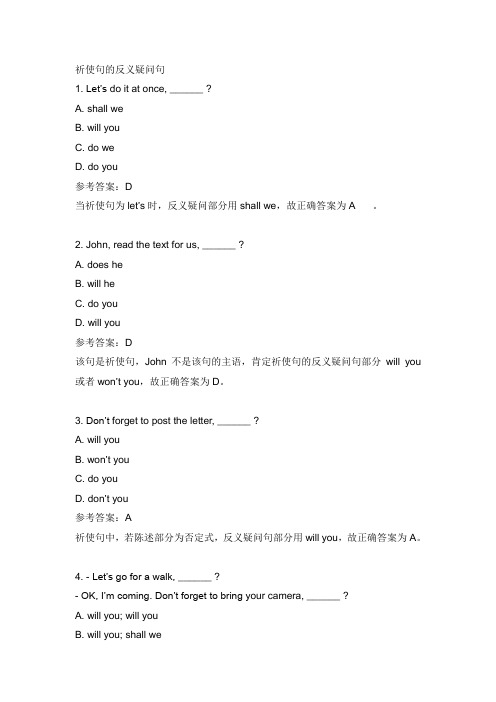
祈使句的反义疑问句1. Let’s do it at once, ______ ?A. shall weB. will youC. do weD. do you参考答案:D当祈使句为let’s时,反义疑问部分用shall we,故正确答案为A 。
2. John, read the text for us, ______ ?A. does heB. will heC. do youD. will you参考答案:D该句是祈使句,John不是该句的主语,肯定祈使句的反义疑问句部分will you 或者won’t you,故正确答案为D。
3. Don’t forget to post the letter, ______ ?A. will youB. won’t youC. do youD. don’t you参考答案:A祈使句中,若陈述部分为否定式,反义疑问句部分用will you,故正确答案为A。
4. - Let’s go for a walk, ______ ?- OK, I’m coming. Don’t forget to bring y our camera, ______ ?A. will you; will youB. will you; shall weC. shall we; shall weD. shall we; will you参考答案:Dlet’s的反义疑问部分用shall we,否定祈使句的反义疑问句部分用will you,故正确答案为D。
5. You girls stand in the front row, ______ ?A. do theyB. will theyC. do youD. will you参考答案:D有时祈使句带有自己的主语,此时不要将其误认为是陈述句,由于该句是祈使句的肯定含义,故正确答案为D。
6. 按要求改写句子。
Don’t tell him the secret.(改为反义疑问句)Don’t tell him the secret, ______ ______ ?参考答案:will you否定祈使句的反义疑问句部分用will you,故该题正确答案为will you。
6:次课祈使句反义疑问句 (1)
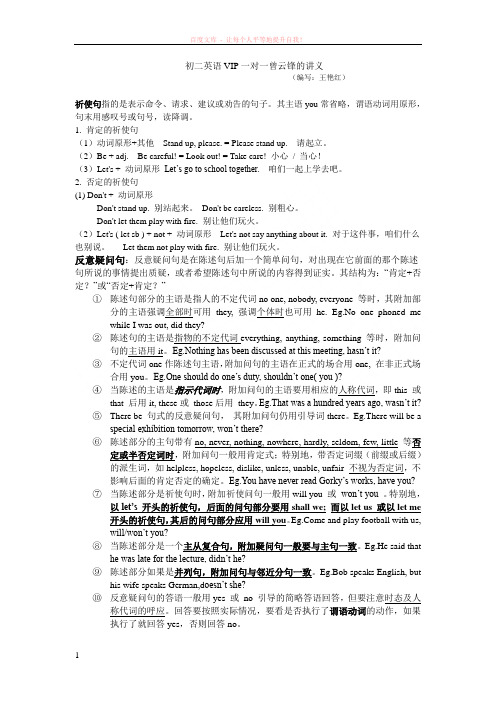
初二英语VIP一对一曾云锋的讲义(编写:王艳红)祈使句指的是表示命令、请求、建议或劝告的句子。
其主语you常省略,谓语动词用原形,句末用感叹号或句号,读降调。
1. 肯定的祈使句(1)动词原形+其他Stand up, please. = Please stand up. 请起立。
(2)Be + adj. Be careful! = Look out! = Take care! 小心/ 当心!(3)Let's + 动词原形Let’s go to school together. 咱们一起上学去吧。
2. 否定的祈使句(1) Don't + 动词原形Don't stand up. 别站起来。
Don't be careless. 别粗心。
Don't let them play with fire. 别让他们玩火。
(2)Let's ( let sb ) + not + 动词原形Let's not say anything about it. 对于这件事,咱们什么也别说。
Let them not play with fire. 别让他们玩火。
反意疑问句:反意疑问句是在陈述句后加一个简单问句,对出现在它前面的那个陈述句所说的事情提出质疑,或者希望陈述句中所说的内容得到证实。
其结构为:“肯定+否定?”或“否定+肯定?”①陈述句部分的主语是指人的不定代词no one, nobody, everyone 等时,其附加部分的主语强调全部时可用they, 强调个体时也可用he. Eg.No one phoned mewhile I was out, did they?②陈述句的主语是指物的不定代词everything, anything, something 等时,附加问句的主语用it。
Eg.Nothing has been discussed at this meeting, hasn’t it?③不定代词one作陈述句主语,附加问句的主语在正式的场合用one, 在非正式场合用you。
祈使句及反义疑问句
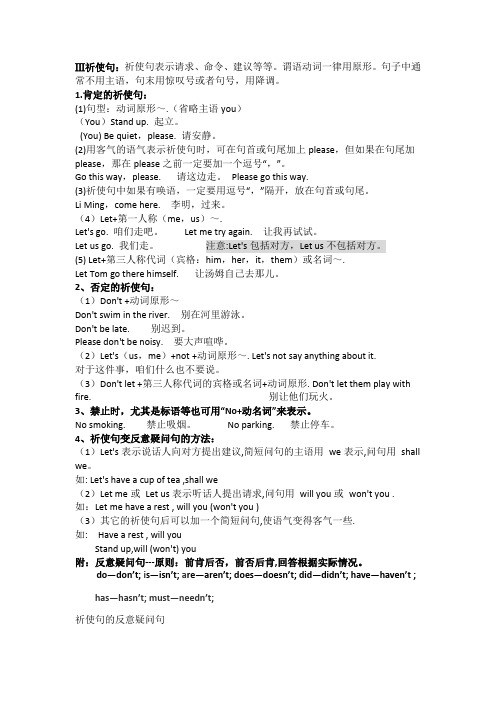
Ⅲ祈使句:祈使句表示请求、命令、建议等等。
谓语动词一律用原形。
句子中通常不用主语,句末用惊叹号或者句号,用降调。
1.肯定的祈使句:(1)句型:动词原形~.(省略主语you)(You)Stand up. 起立。
(You) Be quiet,please. 请安静。
(2)用客气的语气表示祈使句时,可在句首或句尾加上please,但如果在句尾加please,那在please之前一定要加一个逗号“,”。
Go this way,please. 请这边走。
Please go this way.(3)祈使句中如果有唤语,一定要用逗号“,”隔开,放在句首或句尾。
Li Ming,come here. 李明,过来。
(4)Let+第一人称(me,us)~.Let's go. 咱们走吧。
Let me try again. 让我再试试。
Let us go. 我们走。
注意:Let's包括对方,Let us不包括对方。
(5) Let+第三人称代词(宾格:him,her,it,them)或名词~.Let Tom go there himself. 让汤姆自己去那儿。
2、否定的祈使句:(1)Don't +动词原形~Don't swim in the river. 别在河里游泳。
Don't be late. 别迟到。
Please don't be noisy. 要大声喧哗。
(2)Let's(us,me)+not +动词原形~. Let's not say anything about it.对于这件事,咱们什么也不要说。
(3)Don't let +第三人称代词的宾格或名词+动词原形. Don't let them play with fire. 别让他们玩火。
3、禁止时,尤其是标语等也可用“No+动名词”来表示。
No smoking. 禁止吸烟。
No parking. 禁止停车。
祈使句的反义疑问句练习答案

祈使句的反义疑问句1. Let’s do it at once, ______ ?A. shall weB. will youC. do weD. do you参考答案:D当祈使句为let’s时,反义疑问部分用shall we,故正确答案为A 。
2. John, read the text for us, ______ ?A. does heB. will heC. do youD. will you参考答案:D该句是祈使句,John不是该句的主语,肯定祈使句的反义疑问句部分will you 或者won’t you,故正确答案为D。
3. Don’t forget to post the letter, ______ ?A. will youB. won’t youC. do youD. don’t you参考答案:A祈使句中,若陈述部分为否定式,反义疑问句部分用will you,故正确答案为A。
4. - Let’s go for a walk, ______ ?- OK, I’m coming. Don’t forget to bring y our camera, ______ ?A. will you; will youB. will you; shall weC. shall we; shall weD. shall we; will you参考答案:Dlet’s的反义疑问部分用shall we,否定祈使句的反义疑问句部分用will you,故正确答案为D。
5. You girls stand in the front row, ______ ?A. do theyB. will theyC. do youD. will you参考答案:D有时祈使句带有自己的主语,此时不要将其误认为是陈述句,由于该句是祈使句的肯定含义,故正确答案为D。
6. 按要求改写句子。
Don’t tell him the secret.(改为反义疑问句)Don’t tell him the secret, ______ ______ ?参考答案:will you否定祈使句的反义疑问句部分用will you,故该题正确答案为will you。
祈使句及反义疑问句
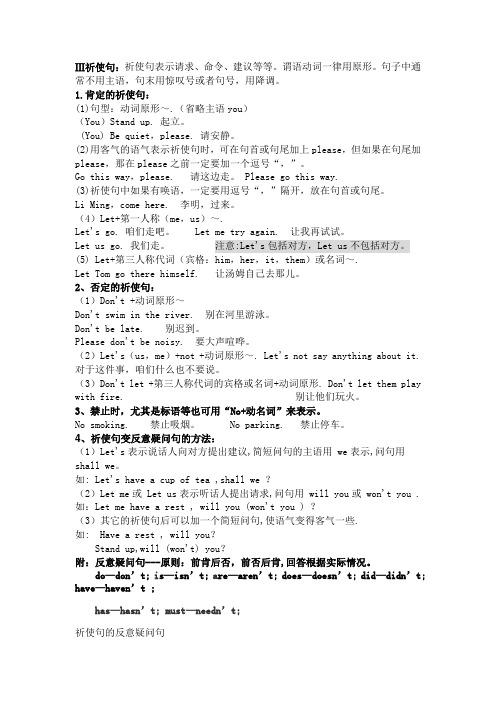
Ⅲ祈使句:祈使句表示请求、命令、建议等等。
谓语动词一律用原形。
句子中通常不用主语,句末用惊叹号或者句号,用降调。
1.肯定的祈使句:(1)句型:动词原形~.(省略主语you)(You)Stand up. 起立。
(You) Be quiet,please. 请安静。
(2)用客气的语气表示祈使句时,可在句首或句尾加上please,但如果在句尾加please,那在please之前一定要加一个逗号“,”。
Go this way,please. 请这边走。
Please go this way.(3)祈使句中如果有唤语,一定要用逗号“,”隔开,放在句首或句尾。
Li Ming,come here. 李明,过来。
(4)Let+第一人称(me,us)~.Let's go. 咱们走吧。
Let me try again. 让我再试试。
Let us go. 我们走。
注意:Let's包括对方,Let us不包括对方。
(5) Let+第三人称代词(宾格:him,her,it,them)或名词~.Let Tom go there himself. 让汤姆自己去那儿。
2、否定的祈使句:(1)Don't +动词原形~Don't swim in the river. 别在河里游泳。
Don't be late. 别迟到。
Please don't be noisy. 要大声喧哗。
(2)Let's(us,me)+not +动词原形~. Let's not say anything about it. 对于这件事,咱们什么也不要说。
(3)Don't let +第三人称代词的宾格或名词+动词原形. Don't let them play with fire. 别让他们玩火。
3、禁止时,尤其是标语等也可用“No+动名词”来表示。
No smoking. 禁止吸烟。
初中英语祈使句、 感叹句、反义疑问句和there be句型

【课堂演练】祈使句的用法指表示请求、命令、建议或劝告等的句子。
句中通常不带主语,谓语动词用原形,句末用叹号或句点。
1、以Be开头的祈使句,Be后常加形容词。
Be careful! 当心!Be quiet! 安静点!2、以动词原形开头的祈使句:(1)肯定形式:Open the door, please.(2)否定形式,句首加don’t:Don’t be late.3、以let开头的祈使句:Let me/us Let him/her/them Let's go to school.4、由“No + 动名词”构成的祈使句,表示禁止,多用于公共场合的标牌或警示语:No parking! 禁止停车!No smoking! 禁止吸烟!No littering! 禁止乱扔垃圾!5、祈使句中的省略:A little more slowly, please. Hands up, please.Quiet, please! Quick!6、祈使句的反意疑问句:(1)以动词原形或don’t开头的祈使句,反意疑问句用will you / won’t you.Don’t be late next time, will you?(2)以Let+宾语(通常为第一或第三人称宾格)+动词原形+其它成分构成的祈使句,完整形式,反意疑问句用will you, 缩写形式用shall we.Let us have a look at your photo, will you?Let’s go swimming, shall we?【注意】1、“祈使句+and/or +简单句”是常用句型:祈使句+ and + 简单句表示“如果…,就…”Go down the street,and you'll see a hospital.祈使句+ or + 简单句表示“…否则…”Be quick,or we'll be late.2、在祈使句后面,常常附加一个问句,使语气更加委婉。
反义疑问句的使用
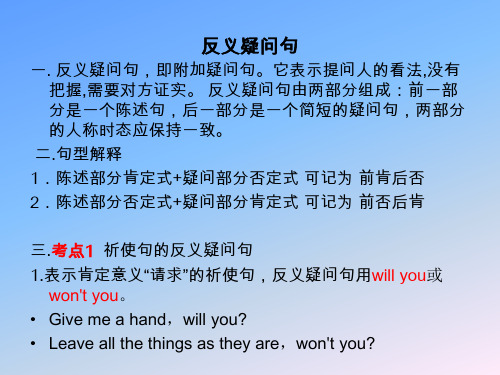
2.当主句的主语为第二、三人称时,其后的反义疑问句则应 与主句相一致(此时,否定只看主句,与从句无关...)
• Your sister supposes he needs no help,_____? • You thought they could have completed the project,___? • They don't believe she's an engineer,____? 六.考点12 并列句的反义疑问句 陈述部分是并列句,反义疑问句要和就近的分句的主语和 谓语一致。(就近原则) • Wang failed the exam last semester , but he studies hard this semester,_____? • I’m Chinese, and she is Japanese,_考点7 陈述部分主语为表示人的不定代词,如everyone, everybody, someone, no one, nobody, somebody,反义 疑问句主语非正式问题中用they,(也可以按语法一致原 则用单数) 2.考点9 陈述部分主语为表示物的不定代词,如everything, anything, nothing等,反义疑问句主语用it 3.考点8 陈述部分主语为to do, doing, 从句, this, that,反义疑问句 主语用it, (these, those则用they)附加 4.考点11 陈述部分是there be句型,反义疑问句主语用there
3. 当must用来表对现在的情况进行推测,反义疑问句通常要 根据must后面的动词采用相应的形式。 He must be good at English,_____? 4. 当must + have done表示对过去的情况进行推测(一般句 中有明确的过去时间状语),反义疑问句要根据陈述部分 谓语的情况用“didn't+主语”或“wasn't/weren't+主语” • She must have read the novel last week,_____? 如果强调动作的完成(一般没有明确的过去时间状语), 反义疑问句要用“haven't/hasn't+主语”。 • You must have told her about it,_____? 五.考点6 复合句的反义疑问句 大多数复合句的反义疑问句都是对主句提问 • He told us how to get to the farm,_____?
祈使句的四种反义疑问句
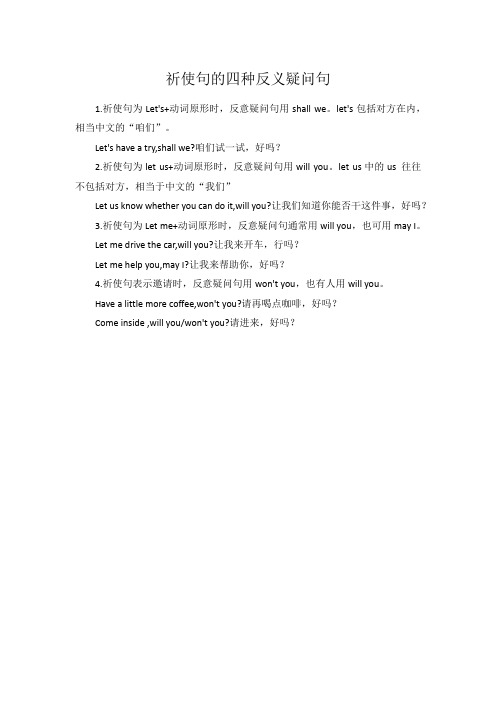
祈使句的四种反义疑问句
1.祈使句为Let's+动词原形时,反意疑问句用shall we。
let's包括对方在内,相当中文的“咱们”。
Let's have a try,shall we?咱们试一试,好吗?
2.祈使句为let us+动词原形时,反意疑问句用will you。
let us中的us 往往不包括对方,相当于中文的“我们”
Let us know whether you can do it,will you?让我们知道你能否干这件事,好吗?
3.祈使句为Let me+动词原形时,反意疑问句通常用will you,也可用may I。
Let me drive the car,will you?让我来开车,行吗?
Let me help you,may I?让我来帮助你,好吗?
4.祈使句表示邀请时,反意疑问句用won't you,也有人用will you。
Have a little more coffee,won't you?请再喝点咖啡,好吗?
Come inside ,will you/won't you?请进来,好吗?。
反义疑问句的 种特殊用法
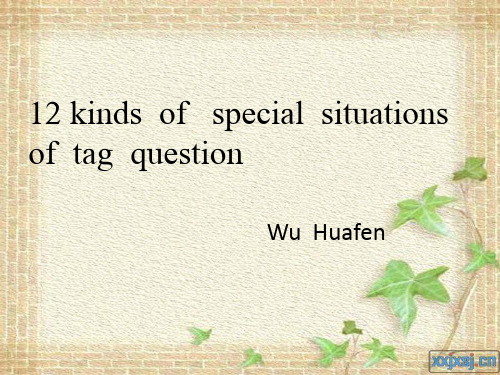
4.陈述部分的主语是everything, nothing, anything或something 时, 反意疑问句的主语应用代词it。 例如:Something is wrong with my radio, isn't it?
我的收音机出毛病了,是吧. Nothing is right , is it ?
7.当陈述部分含有以下这些含有否定意义的词时:few, little, seldom, hardly, never, not, no, no one, nobody, nothing, none, neither等,其反意疑 问句需用肯定结构。 例如:He is never late for school, is he? 他上学从不迟到,是吗? 当陈述部分所含的否定词是通过加前缀或后缀构成的,其后的反意疑问 句依然用否定结构。例如:It is unfair, isn't it? 这不公平,是吧?
9.陈述部分有have to 时,其反意疑问句要用助动词的否定形式。 例如: You have to water the vegetables every day, don't you? 你每天都要浇菜,对吧?
10.陈述部分是there be句型时,其反意疑问句中要用there。 例如: There was a hospital here, wasn't there? 过去这儿有家医院,是 吗?
反义疑问句【详解】

• He didn’t go to the lecture yesterday, _____ did he? does she? • She doesn’t like the photo, ____ hasn’tshe? • She has gone abroad, _____ 反义疑问句的几种特殊用法: 1. 当陈述部分的主语是everybody, ever等不定代词时,反意疑问 句部分中的主语常用they。 Everyone is here, aren’t they? 2. 当陈述部分的主语是everything, anything, nothing, something等表物的不定代词时,反意疑问部分的主 语常用it。 Something is wrong with my radio, isn't it?
What a cold day, isn’t it?
10. 当陈述部分的谓语动词包括have to, had to时,反 意疑问部分通常用do的适当形式。 You had to take the early bus, didn’t you? He has to look after the child, doesn’t he? 11.当陈述部分含有情态动词must时,如果must 作 “一定;要;必须”讲,反意疑问句须用mustn't或 needn't;而当must作推测意义“一定是;必定”讲 时,反意疑问句则需根据must后的动词原形选用相 应的形式。 You must work harder and harder, mustn't you? Tom must be at home, isn't he?
3. 祈使句的反义疑问句:如果祈使句为肯定结构,则用 “won’t you?”或“will you?”。如果祈使句为否定结构, 则用“will you?”。 Look at the blackboard, will you/won’t you? Don’t talk in class, will you? 4. 以Let’s开头的祈使句,反义疑问句用“shall we?”,以 Let us开头的,用“will you?” Let’s go to the cinema, shall we? Let us read the story, will you? 5. 陈述句的谓语含有助动词(do, does, did, have, has) 时, 反义疑问句也需要使用这些词。
反义疑问句讲解及答案

反义疑问句讲解及答案反义疑问句是一种附加疑问句,用于表示提问人的不确定或需要对方证实的看法。
这种句型由两部分组成,即陈述句和简短的疑问句,两部分的人称时态应保持一致。
陈述部分为肯定式时,疑问部分为否定式,反之亦然。
例如,昨天她病了,是吗?你没去,是吧?在特殊情况下,祈使句也可以构成反义疑问句。
通常情况下,祈使句后会加上will you或won't you,用于表示请求或提醒对方注意。
当祈使句以Let开头时,反义疑问句有两种情况:以shall we或shan't we结尾,或以will you或won't you结尾。
例如,回家吧,好吗?让我试一试,行吗?当陈述部分含有I think (believe。
suppose。
)that。
结构时,反义疑问句的主语必须是第一人称,并且须与从句的主、谓语保持一致。
如果是非第一人称,则反义疑问句的主语应与主句的主语相一致。
当陈述部分为I(We) don’t think(believe。
suppose。
consider)+that从句时,问句部分的动词和主语仍与that从句保持一致且用肯定式。
例如,我认为他不会来,对吗?他认为她会来,不是吗?我们不相信这个消息是真的,是吗?When using a statement in the form of subject + said (told。
reported。
asked。
) + that clause for a tag n。
the verb and subjectof the n part should agree with those of the main clause。
For example:①They said that you had finished your work。
didn't they。
(Not "hadn't you?")②Kate told you that she would go there。
祈使句反义疑问句的用法总结
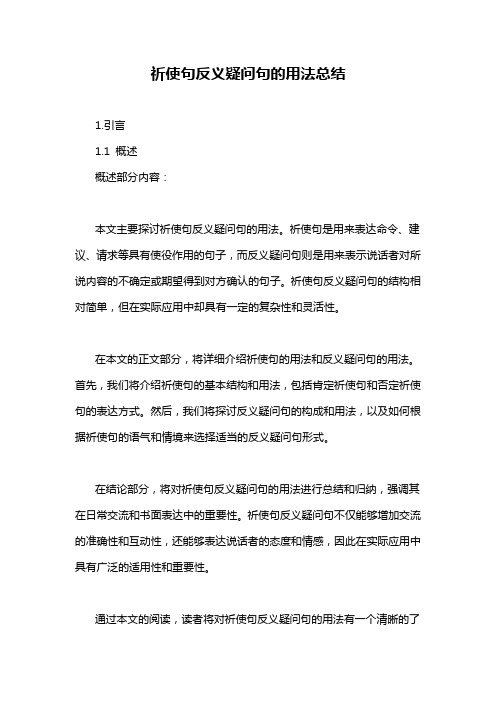
祈使句反义疑问句的用法总结1.引言1.1 概述概述部分内容:本文主要探讨祈使句反义疑问句的用法。
祈使句是用来表达命令、建议、请求等具有使役作用的句子,而反义疑问句则是用来表示说话者对所说内容的不确定或期望得到对方确认的句子。
祈使句反义疑问句的结构相对简单,但在实际应用中却具有一定的复杂性和灵活性。
在本文的正文部分,将详细介绍祈使句的用法和反义疑问句的用法。
首先,我们将介绍祈使句的基本结构和用法,包括肯定祈使句和否定祈使句的表达方式。
然后,我们将探讨反义疑问句的构成和用法,以及如何根据祈使句的语气和情境来选择适当的反义疑问句形式。
在结论部分,将对祈使句反义疑问句的用法进行总结和归纳,强调其在日常交流和书面表达中的重要性。
祈使句反义疑问句不仅能够增加交流的准确性和互动性,还能够表达说话者的态度和情感,因此在实际应用中具有广泛的适用性和重要性。
通过本文的阅读,读者将对祈使句反义疑问句的用法有一个清晰的了解,并能够在实际应用中灵活运用,提高自己的语言表达能力。
同时,本文也为相关领域的研究者提供了一个扎实的基础,可以进一步深入研究和探索祈使句反义疑问句的语法规律和语义特点。
1.2文章结构1.2 文章结构文章将分为引言、正文和结论三个部分,每个部分将侧重不同的内容和目标。
引言部分将概述祈使句反义疑问句的用法,并说明文章的目的和结构。
这将给读者一个整体的了解,引导他们更好地理解和阅读接下来的内容。
正文部分将进一步探讨祈使句和反义疑问句的用法。
首先,将介绍祈使句的定义和用法,包括用于表示命令、请求、建议等情况的简洁句式。
然后,将介绍反义疑问句的定义和用法,包括用于陈述句后提出表达确认的疑问句。
在介绍每种用法时,将提供具体的例子和解释,以帮助读者更好地理解。
结论部分将对祈使句反义疑问句的用法进行总结,并强调其重要性。
总结部分将回顾祈使句和反义疑问句的基本用法,强调其在语言表达中的重要性和灵活性。
然后,将探讨祈使句反义疑问句的重要性,并讨论如何在不同情境下使用这些句式来达到更好的沟通效果。
反义疑问句(含解析、例句及详尽用法)
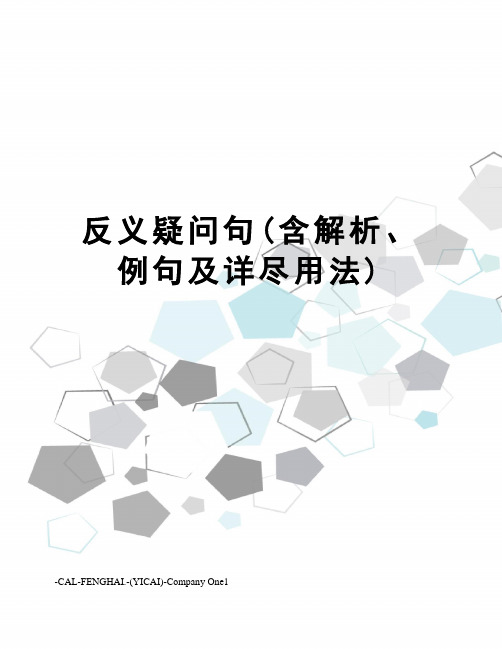
反义疑问句(含解析、例句及详尽用法)-CAL-FENGHAI.-(YICAI)-Company One1反义疑问句一、祈使句的反义疑问句1、肯定祈使句Will you/won’t you2、否定祈使句Will you3、Let的祈使句Let us ...,will you(此处Let us 表示“允许我们...”)Let’s...,shall we (此处Let’s表示“让我们...吧”)Let + 第三人称...,will you二、Must的反义疑问句1、表示“必须” musn’t /needn’tEg. You must go now, needn’t you2、表示“不准”Eg. You musn’t smoke here, must/may you3、表示推测,肯定。
(I’m sure + 从句)Eg. You must be hungry now, aren’t youI’m sure you are hungry now, aren’t youShe must have heard about that, hasn’t sheI’m sure you have heard about that, haven’t youYou must have watched that movie last night, didn’t you(last nigh为具体时间点,所以用一般过去式)三、主语(反义疑问句)+从句主句:I(don’t)think/believe/consider/suppose 或 I’m afraid/sure...后跟从句时,可将从句部分进行反义疑问Eg. I don’t think he will win, will heI think he will win, won’t heShe thinks he will win, doesn’t she(当主句主语不是I时不适用于该用法,此句中的翻译疑问针对的是主句而非从句)四、当句中包含有表示否定意义的副词或不定代词时,反义疑问句用肯定形式Eg. Nothing happened to him, did itIt is unfair, isn’t itHe dislikes watching TV, doesn’t he(该句中含否定意义的是动词而非副词或不定代词,因此不适用于该用法,反义疑问句仍然使用否定形式)五、反义疑问句的回答反义疑问句的回答针对被提问部分的谓语动词,且与回答句前部分的Yes和No 保持一致Eg. A: You haven’t lost the ticket, have youB: D I know it’s hard to get another one at this moment.A. Yes, I haven’tB. No, I haveC. I hope soD. I’m afraid not六、陈述部分的主语与反义疑问句主语保持一致的情况1、OneEg. One can’t be too careful when driving a car, can one/he一个人在开车的时候再怎么小心也不为过。
反义疑问句

反义疑问句的12种特殊句型1.在由祈使句+疑问部分构成的反义疑问句中,疑问部分通常用will you, won’t you, would you,有时也可以用can you , can’t you, why don’t you, could you等,但不用do,即使祈使句中有助动词do 时也是这样,Pass me the dictionary, will (would)you?Don’t do that again, will you?在含有let的祈使句后的反义疑问句部分,如果let 的宾语us包括听者(常写为let’s)时用shall we,不包括听者(常写为let us)时用will you. Let的宾语是me时,要根据意思用will you或may I 。
let 的宾语是第三人称时用will you .Let him speak first,will you ?2.当陈述部分带有情态动词must 时,反义疑问部分要根据Must的意思不同而有所变化。
如果must 表示必须,有必要时,反义疑问部分用musn’t 或neen’t .如I must hand in my exercise book now,must’t I (needn’t I )?如果must n’t 表示禁止时,疑问部分一般用mustYou mustn’t take the magazine out of the reading room,must you ?若must 表示想必,一定等推测意义时,则疑问部分不用must,而要根据must 之后的动词结构及含义使用相应的动词形式。
如:He must be your English teacher, isn’t he ?Chinese must have the largest number of speakers, doesn’t it ?You must have read read the book yesterday , didn’t he?3.当陈述部分的主语为nothing , anything, everything等不定代词时,反义疑问部分主语用it ,如:Nothing could prevent him from going there, could it?如果陈述部分的主语为nobody,somebody,none,someone,no one,anyone,anybody,everyone等不定代词,反义疑问部分主语用they 或he,如:Somebody took my umbrella away yesterday, didn’t they/he ?4.当陈述部分带有that从句作宾语时,反义疑问部分应与主句的主语和谓语一致。
反义疑问句练习题(附答案)

反意疑问句一、祈使句后的反意疑问句:祈使句后加一个反意疑问句,使祈使句变得更加委婉。
肯定祈使句的反意疑问句通常用will you, won’t you, would you, can you, can’t you等来表达不同的含义。
在否定的祈使句后的反意疑问句通常只用will you。
1、表示“请求”,肯定祈使句的反意疑问句用will you。
如:Give me a hand, will you?2、表示“邀请”、“劝诱”时,肯定祈使句后的反意疑问句用won’t you。
如:Have another cup of tea, won’t you?3、表示“催促”、“不耐烦”时,肯定祈使句后的反意疑问句用can’t you。
如:Stop talking, can’t you?4、用“Let’s…”开头的肯定祈使句表示“提议、建议、主张”,其后的反意疑问句用shall we。
如:Let’s have a try, shall we?但是以Let us…或Let me…开头的祈使句后的反意疑问句则要用will you。
如:Let us go now, will you?5、否定祈使句的反意疑问句只用will you。
如:Don’t take away my dictionary, will you?以Let’s not…开头的祈使句后的反意疑问句,用all right或OK。
二、复合句的反意疑问句其反意疑问的主谓语视其主要内容而定,不能一概说以主句为准还是以从句为准。
1、多数复合句后的反意疑问句的主、谓语同主句的主、谓语一致。
如:He said he was a teacher, didn’t he2、①主句是I think(suppose, consider, believe, guess, expect, imagine, feel, am afraid, hear, say 等)+宾语从句时,反意疑问句的主、谓语应与从句的主、谓语一致。
- 1、下载文档前请自行甄别文档内容的完整性,平台不提供额外的编辑、内容补充、找答案等附加服务。
- 2、"仅部分预览"的文档,不可在线预览部分如存在完整性等问题,可反馈申请退款(可完整预览的文档不适用该条件!)。
- 3、如文档侵犯您的权益,请联系客服反馈,我们会尽快为您处理(人工客服工作时间:9:00-18:30)。
1. 基本原则
若陈述部分为祈使句,反意疑问句通常用will you, won’t you, would you等:
Mail the letter today, will you 今天就把信发掉,好吗
Try to be back by two, won’t you 设法两点之前回来,好吗
If you want help, let me know, would you 如果你需要帮助,告诉我,好吗
【注】若陈述部分为否定式,则反意疑问句部分只用will you:
`
Don’t forget to post the letter, will you 请别忘了寄信。
有时根据语境的需要,反意疑问句也可以用can you, can’t you 等:
Give me some cigarettes, can you 给我些香烟,可以吗
Walk faster, can’t you 走快点,不行吗
一般说来,用will you, won’t you, would you 等构成的反意疑问句语气较委婉。
比较:
(
Be quiet, will you 请安静,好吗
Be quiet, can’t you 你不能安静点吗
2. 当祈使句为Let’s…时
反意疑问句总是用 shall we:
Let’s phone her now, shall we 我们现在就给她打电话,好吗
:
Let’s go to the cinema tonight, shall we 今晚咱们去看电影,好吗
From: 当祈使句为Let us…时
若表示请求,反意疑问句用will you,若表示建议,反意疑问句用 shall we:
Let us know your address, will you 请把你的地址告诉我们,好吗
Let us go swimming together, shall we 我们一起去游泳好吗
\
【注】let’s…只表示建议,所以其后反意疑问句总是用shall we。
而let us…既可表示建议请求,也可表示建议(较正式),其后的反意疑问句要根据这两种不同情况分别使用will you和shall we。
4. 当祈使句带有主语时
有时祈使句带有自己的主语,此时不要将其误认为是陈述句:
Jim, you go there to help him, will you 吉姆,你去那儿帮他,好吗
You girls stand in the front row, will you 你们女孩子站在前排,好吗
【注】不要将这类祈使句误认为是陈述句,而误用don’t you这样的反意疑问句。
From:。
